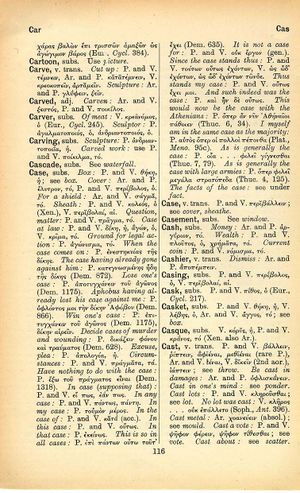case: Difference between revisions
Θνητὸς πεφυκὼς τοὐπίσω πειρῶ βλέπειν → Homo natus id, quod instat, ut videas, age → Als sterblich Wesen mühe dich zu seh'n, was folgt
(CSV3) |
mNo edit summary |
||
| Line 2: | Line 2: | ||
|Text=[[File:woodhouse_116.jpg|thumb|link={{filepath:woodhouse_116.jpg}}]]'''subs.''' | |Text=[[File:woodhouse_116.jpg|thumb|link={{filepath:woodhouse_116.jpg}}]]'''subs.''' | ||
[[box]]: P. and V. [[θήκη]], ἡ; see [[box]]. | |||
[[cover]]: Ar. and P. [[ἔλυτρον]], τό, P. and V. [[περίβολος]], ὁ. | |||
[[for a shield]]: Ar. and V. [[σάγμα]], τό. | |||
[[sheath]]: P. and V. [[κολεός]], ὁ (Xen.), V. [[περιβολαί]], αἱ. | |||
[[question]], [[matter]]: P. and V. [[πρᾶγμα]], τό. | |||
[[case at law]]: P. and V. [[δίκη]], ἡ, [[ἀγών]], ὁ, V. [[κρῖμα]], τό. | |||
[[ground for legal action]]: P. [[ἀγώνισμα]], τό. | |||
[[when the case comes on]]: P. [[ἐνεστηκυίας]] [[τῆς]] [[δίκης]]. | |||
[[the case having already gone against him]]: P. [[κατεγνωσμένης]] [[ἤδη]] [[τῆς]] [[δίκης]] (Dem. 872). | |||
[[lose one's case]]: P. [[ἀποτυγχάνειν]] [[τοῦ]] [[ἀγῶνος]] (Dem. 1175). | |||
[[aphobus having already lost his case against me]]: P. [[ὀφλόντος]] [[μοι]] [[τὴν]] [[δίκην]] [[Ἀφόβου]] (Dem. 866). | |||
[[win one's case]]: P. [[ἐπιτυγχάνειν]] [[τοῦ]] [[ἀγῶνος]] (Dem. 1175), [[δίκην]] [[αἱρεῖν]]. | |||
[[decide cases of murder and wounding]]: P. [[δικάζειν]] [[φόνου]] [[καὶ]] [[τραύματος]] (Dem. 628). | |||
[[excuse]], [[plea]]: P. [[ἀπολογία]], ἡ. | |||
[[circumstances]]: P. and V. [[πράγματα]], τά. | |||
[[have nothing to do with the case]]: P. [[ἔξω]] [[τοῦ]] [[πράγματος]] [[εἶναι]] (Dem. 1318). | |||
[[in case]] ([[supposing that]]): P. and V. εἴ [[πως]], [[ἐάν]] [[πως]]. | |||
[[in any case]]: P. and V. [[πάντως]], [[πάντη]]. | |||
[[in my case]]: P. [[τοὐμὸν]] [[μέρος]]. | |||
[[in the caise of]]: P. and V. [[κατά]] (acc.). | |||
[[in this case]]: P. and V. [[οὕτως]]. | |||
[[in that case]]: P. [[ἐκείνως]]. | |||
[[this is so in all cases]]: P. [[ἐπὶ]] [[πάντων]] [[οὕτω]] [[τοῦτʼ]] [[ἔχει]] (Dem. 635). | |||
[[it is not a case for]]: P. and V. [[οὐκ]] [[ἔργον]] (gen.). | |||
[[since the case stands thus]]: P. and V. [[τούτων]] [[οὕτως]] [[ἐχόντων]], V. ὡς [[ὧδʼ]] [[ἐχόντων]], ὡς [[ὧδʼ]] [[ἐχόντων]] [[τῶνδε]]. | |||
[[thus stands my case]]: P. and V. [[οὕτως]] [[ἔχει]] [[μοι]]. | |||
[[and such indeed was the case]]: P. [[καὶ]] ἦν δὲ [[οὕτως]]. | |||
this would now be the case with the [[Athenian]]s: P. [[ὅπερ]] ἄν [[νῦν]] [[Ἀθηναῖοι]] [[πάθοιεν]] (Thuc. 6, 34). | |||
[[I myself am in the same case as the majority]]: P. [[αὐτὸς]] [[ὅπερ]] οἱ [[πολλοὶ]] [[πέπονθα]] (Plat., [[meno]]. 95C). | |||
[[as is generally the case]]: P. [[οἷα]] . . . [[φιλεῖ]] [[γίγνομαι|γίγνεσθαι]] (Thuc. 7, 79). | |||
[[as is generally the case with large armies]]: P. [[ὅπερ]] [[φιλεῖ]] [[μεγάλα]] [[στρατόπεδα]] (Thuc. 4, 125). | |||
[[the facts of the case]]: see under [[fact]]. | |||
'''v. trans.''' | '''v. trans.''' | ||
P. and V. περιβάλλειν; see [[cover]], [[sheathe]]. | P. and V. [[περιβάλλειν]]; see [[cover]], [[sheathe]]. | ||
}} | }} | ||
Revision as of 19:02, 14 April 2020
English > Greek (Woodhouse)
subs.
box: P. and V. θήκη, ἡ; see box.
cover: Ar. and P. ἔλυτρον, τό, P. and V. περίβολος, ὁ.
for a shield: Ar. and V. σάγμα, τό.
sheath: P. and V. κολεός, ὁ (Xen.), V. περιβολαί, αἱ.
question, matter: P. and V. πρᾶγμα, τό.
case at law: P. and V. δίκη, ἡ, ἀγών, ὁ, V. κρῖμα, τό.
ground for legal action: P. ἀγώνισμα, τό.
when the case comes on: P. ἐνεστηκυίας τῆς δίκης.
the case having already gone against him: P. κατεγνωσμένης ἤδη τῆς δίκης (Dem. 872).
lose one's case: P. ἀποτυγχάνειν τοῦ ἀγῶνος (Dem. 1175).
aphobus having already lost his case against me: P. ὀφλόντος μοι τὴν δίκην Ἀφόβου (Dem. 866).
win one's case: P. ἐπιτυγχάνειν τοῦ ἀγῶνος (Dem. 1175), δίκην αἱρεῖν.
decide cases of murder and wounding: P. δικάζειν φόνου καὶ τραύματος (Dem. 628).
circumstances: P. and V. πράγματα, τά.
have nothing to do with the case: P. ἔξω τοῦ πράγματος εἶναι (Dem. 1318).
in case (supposing that): P. and V. εἴ πως, ἐάν πως.
in any case: P. and V. πάντως, πάντη.
in my case: P. τοὐμὸν μέρος.
in the caise of: P. and V. κατά (acc.).
in this case: P. and V. οὕτως.
in that case: P. ἐκείνως.
this is so in all cases: P. ἐπὶ πάντων οὕτω τοῦτʼ ἔχει (Dem. 635).
it is not a case for: P. and V. οὐκ ἔργον (gen.).
since the case stands thus: P. and V. τούτων οὕτως ἐχόντων, V. ὡς ὧδʼ ἐχόντων, ὡς ὧδʼ ἐχόντων τῶνδε.
thus stands my case: P. and V. οὕτως ἔχει μοι.
and such indeed was the case: P. καὶ ἦν δὲ οὕτως.
this would now be the case with the Athenians: P. ὅπερ ἄν νῦν Ἀθηναῖοι πάθοιεν (Thuc. 6, 34).
I myself am in the same case as the majority: P. αὐτὸς ὅπερ οἱ πολλοὶ πέπονθα (Plat., meno. 95C).
as is generally the case: P. οἷα . . . φιλεῖ γίγνεσθαι (Thuc. 7, 79).
as is generally the case with large armies: P. ὅπερ φιλεῖ μεγάλα στρατόπεδα (Thuc. 4, 125).
the facts of the case: see under fact.
v. trans.
P. and V. περιβάλλειν; see cover, sheathe.

